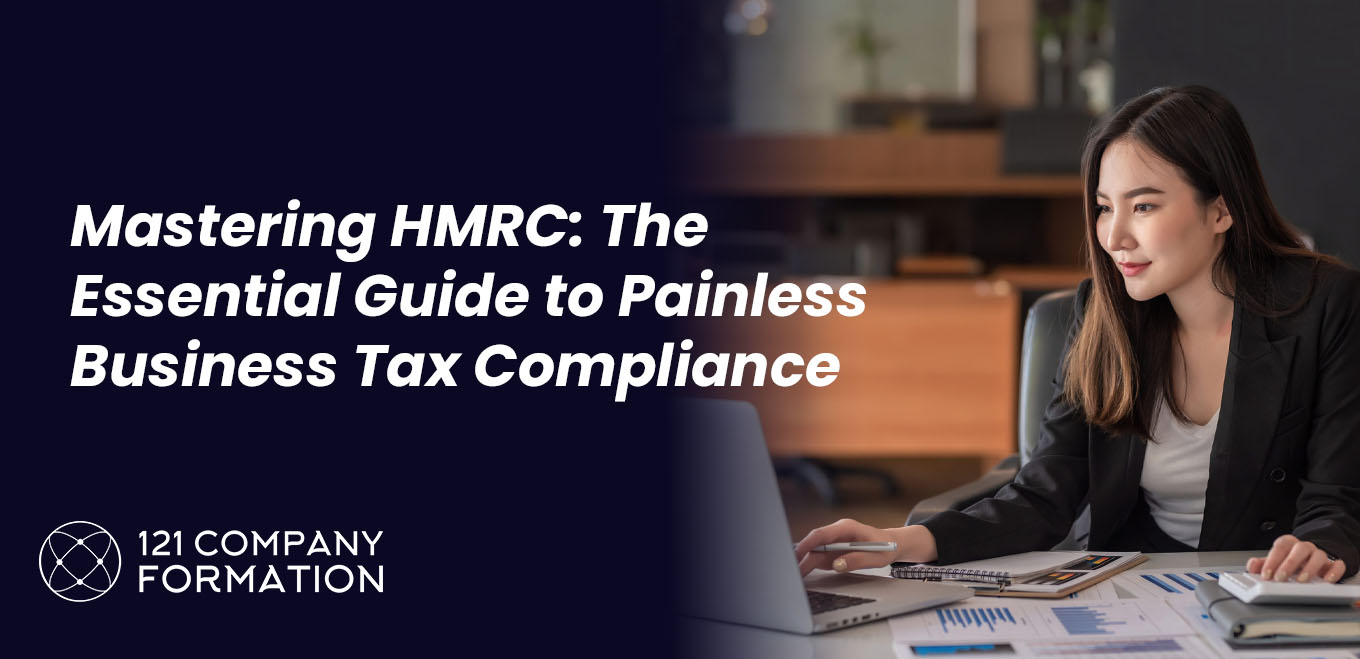- Email: Info@121companyformation.Co.Uk
- Phone: +44 (0)203 8932 121
14 Aug

Mastering HMRC (His Majesty’s Revenue and Customs) is the United Kingdom government’s tax authority. It is responsible for collecting taxes, administering benefits, and enforcing tax and customs laws. This includes Corporation Tax, Income Tax (for sole traders and partnerships), Value Added Tax (VAT), and Pay as You Earn (PAYE) for employees. Missing deadlines, making errors, or failing to keep adequate records can lead to severe consequences, making proactive and diligent compliance critical.
For any business operating in the UK, navigating the labyrinthine world of HMRC is an unavoidable reality. You might even find yourself asking, “How does HMRC affect my business?!” Understanding HMRC compliance isn’t just about ticking boxes; it’s about safeguarding your financial health, avoiding costly penalties, and ensuring the smooth operation of your enterprise. This comprehensive guide will equip you with the knowledge and strategies to achieve painless business tax compliance. If you are a sole trader or a limited company director, keep reading – we’ll talk you through everything you need to know.
Understanding Your Obligations: The Foundation of Tax Compliance for Businesses
Effective compliance starts with a clear understanding of your specific obligations. These will vary depending on your business structure (sole trader, partnership, limited company) and whether you employ staff or are VAT-registered. In the following sections, we’ll break down the key registration processes and tax types relevant to most UK businesses.”
Registering Your Business with HMRC
One of the first steps for any new venture is to register with HMRC. This ensures you’re on their radar for the relevant taxes. For limited companies, this happens automatically when you register with Companies House. Sole traders and partnerships, however, need to register for Self Assessment. Timely registration is crucial to avoid initial penalties.
Corporation Tax: The Backbone of Company Compliance
Limited companies are subject to Corporation Tax on their profits. This involves calculating your taxable profit, filing a Company Tax Return (CT600), and paying your tax by the deadline. Accurate record-keeping of all income and expenditure is paramount for correct Corporation Tax calculations. Accurate record-keeping of all income and expenditure is paramount for correct Corporation Tax calculations, as discrepancies can raise red flags with HMRC and impact your overall compliance.
VAT: Navigating the Rules for Small Businesses
Value Added Tax (VAT) is a consumption tax added to most goods and services. You must register for VAT if your business’s VAT-taxable turnover exceeds the current threshold (which is £90,000 as of early 2025). Even if your turnover is below this, voluntary registration might be beneficial in some cases, allowing you to reclaim VAT on your purchases. However, it also means you’ll need to charge VAT on your sales and submit regular VAT returns.
The VAT rules for small businesses can seem intricate, encompassing different VAT rates (standard, reduced, zero-rated, and exempt supplies) and various schemes designed to simplify accounting, such as the Flat Rate Scheme or Cash Accounting Scheme. Understanding which applies to your business and how to correctly apply it is vital to avoid errors and potential underpayments or overpayments. Your accountants can give you professional advice to help you understand which is best for you.
PAYE and National Insurance: Compliance for Employers
If you employ staff, you become responsible for operating a PAYE (Pay As You Earn) scheme. This involves deducting Income Tax and National Insurance Contributions (NICs) from your employees’ wages and paying these over to HMRC. Beyond deductions, compliance for employers extends to providing payslips, reporting payroll information to HMRC in real-time (RTI), and issuing P60s at the end of each tax year.
Furthermore, employers have obligations regarding workplace pensions (auto-enrolment), minimum wage adherence, and maintaining accurate employment records. Failure to meet these requirements can result in significant fines and legal issues. It is the responsibility of the employer to make sure that these aspects of their operation are managed effectively to avoid penalties.
What Triggers an HMRC Investigation Identifying and Mitigating Risks
No business wants to face an HMRC investigation, as it can be time-consuming, stressful, and potentially costly. Understanding what could trigger an HMRC investigation can help you proactively manage your affairs and reduce the likelihood of scrutiny.
Common triggers include:
- Inaccuracies or inconsistencies in tax returns: Even innocent mistakes can flag your account for review. Significant year-on-year changes in income or expenses without clear Justification is particularly scrutinised.
- Late or non-filing of returns: Persistent delays or complete failure to file can quickly lead to an investigation.
- Discrepancies with third-party data: HMRC receives information from various sources, such as banks and other government departments. If this data doesn’t match what you’ve declared, it will raise questions.
- Operating in a high-risk industry: Certain sectors, particularly those with a high volume of cash transactions, are considered higher risk by HMRC.
- Unexplained wealth or lifestyle: If your spending appears beyond your declared income, HMRC might suspect undeclared earnings.
Tip-offs: Unfortunately, disgruntled ex-employees or competitors can provide information to HMRC that may lead to an investigation. To mitigate these risks, it’s essential to cultivate a culture of accuracy and transparency within your business. Regularly review your financial records, reconcile your bank statements, and ensure all transactions are properly documented.
How to Avoid HMRC Fines: Best Practices for Painless Compliance
The best defense against HMRC penalties 2024 and beyond is a robust, proactive approach to compliance. Here’s how to avoid HMRC penalties:
- Accurate Record-Keeping: This cannot be stressed enough. Maintain meticulous and organized records of all income, expenses, invoices, receipts, bank statements, and payroll data. Digital record-keeping solutions can be incredibly helpful here. This also ensures your foundational data is solid.
- Meet All Deadlines: HMRC operates on strict deadlines for filing returns and paying taxes. Even a slight delay beyond these deadlines, specifically by one day, can lead to the immediate imposition of penalties. Set up reminders and aim to submit and pay well in advance of the due dates.
- Double-check Your Returns: Before submitting any tax return, review it thoroughly for errors or omissions. Consider having a second pair of eyes, ideally, an accountant, review it.
- Understand Your Tax Obligations: Be fully aware of which taxes apply to your business and the specific rules for each. Don’t assume anything; if in doubt, seek professional advice.
- Respond Promptly to HMRC Correspondence: Ignoring letters or emails from HMRC can escalate minor issues into significant problems. Always open and read their communications immediately and respond as required, or seek advice if unsure.
- Seek Professional Advice: For complex tax matters or if you’re unsure about any aspect of compliance, engaging a qualified accountant or tax advisor is a wise investment. They can help ensure accuracy, identify potential issues, and represent you in dealings with HMRC. This is especially true for intricate aspects of HMRC compliance for businesses.
Common HMRC Penalties 2024 and How to Address Them
Despite best efforts, mistakes can happen. It’s important to be aware of the common HMRC penalties in 2024 and how they are applied. Penalties vary depending on the type of tax, the amount of tax understated, and whether the error was careless, deliberate, or deliberate and concealed.
- Late Filing Penalties: For Corporation Tax, a £100 penalty is typically issued if your Corporation Tax ( CT600) is one day late, with further penalties for longer delays. For self-assessment, similar penalties apply.
- Late Payment Penalties: If you don’t pay your tax by the deadline, interest will accrue, and you may face late payment penalties.
- Inaccuracy Penalties: These are often the most significant. If HMRC finds inaccuracies in your tax returns, the penalty amount will depend on the nature of the error. For genuine, honest mistakes, the penalty might be 0%. However, if the error is due to negligence, HMRC may charge a penalty ranging from 15% to 30% of the additional tax owed. For deliberate inaccuracies, this can jump to 30-70%, and for deliberate and concealed inaccuracies, it can be as high as 100%.
If you’ve received a penalty notice, it’s crucial to act promptly and respond without delay. You may have a “reasonable excuse” for the error or delay, in which case you can appeal the penalty. Examples of reasonable excuses include serious illness, unexpected postal delays, or a fire destroying your records. However, simply forgetting or relying on someone else to submit your return is typically not considered a reasonable excuse.
The Digital Future: Making Tax Digital (MTD)
Tax compliance in the UK is evolving with HMRC’s Making Tax Digital (MTD) initiative. Making Tax Digital aims to modernize the tax system, making it easier for individuals and businesses to get their tax right and keep their tax records digitally.
Currently, Making Tax Digital for VAT is mandatory for most VAT-registered businesses. This means businesses must keep digital records and use MTD-compatible software to submit their VAT returns.
Looking ahead, Making Tax Digital for Income Tax Self-Assessment (MTD ITSA) is being rolled out. While initially delayed, it will eventually require self-employed individuals and landlords with income over a certain threshold to keep digital records and submit quarterly updates to HMRC using MTD-compatible software. This will fundamentally change how many small businesses manage their tax affairs. Staying informed about these changes and adopting appropriate digital tools will be increasingly important for seamless HMRC compliance.
Building a Robust Compliance Strategy
To truly achieve painless business tax compliance, consider implementing a robust strategy that incorporates the following elements:
- Dedicated Financial Management: Whether it’s an in-house team or an outsourced accounting firm, ensure you have dedicated resources for managing your financial records and tax obligations.
- Regular Reconciliation: Periodically reconcile your bank statements with your accounting records to identify and resolve discrepancies promptly.
- Internal Controls: Implement effective and efficient internal control processes to reduce the risk of inaccuracies or fraud. This could include segregating duties, requiring dual authorization for payments, and regular internal audits.
- Stay Updated: Tax laws and HMRC guidance can change. Subscribe to HMRC updates, and industry newsletters, or work with an accountant who keeps abreast of regulatory shifts. This is particularly relevant to keeping up with changes that affect tax efficiency.
- Proactive Planning: Don’t wait until the last minute to think about your tax obligations. Incorporate tax planning into your business strategy to anticipate liabilities and manage cash flow effectively.
- Maintain Professional Relationships: Foster a good relationship with your accountant and, if applicable, your Customer Compliance Manager (CCM) at HMRC. Open communication can often resolve minor issues before they escalate.
Your Path to Painless HMRC Compliance
Mastering HMRC compliance for businesses is not an insurmountable challenge. By understanding your obligations, maintaining meticulous records, adhering to deadlines, and proactively addressing potential risks, you can significantly reduce the stress and financial burden associated with business taxation.
Remember, HMRC is there to collect tax, and they have increasing powers and data analysis capabilities to ensure compliance. Taking a proactive, organized, and informed approach is the most effective way to ensure your business remains compliant, avoids costly HMRC penalties in 2024, and can focus on what it does best: thriving. If you’re ever in doubt about how HMRC affects my business in a specific scenario, always seek professional advice. Your future financial well-being depends on it.
Overall, proactive compliance management is critical for any business, allowing you to operate smoothly in the UK’s regulatory landscape.
Further reading and professional advice
We extend our sincere gratitude for taking the time to read through our detailed guide on HMRC compliance. We understand the critical importance of getting this right for your business, and we’ve strived to provide you with a clear, actionable roadmap to navigate these regulations efficiently.
Just remember: This isn’t just about avoiding penalties; it’s about building a financially resilient and compliant business that can thrive. We trust that the insights on understanding your obligations, preventing investigations, and avoiding fines will prove invaluable.
Keep these principles at the forefront of your operations: accuracy, punctuality, and professional advice when needed. Your diligence in these areas will ensure a smoother, more secure financial journey for your business.
121 company formation can help you register a company online. minutes. Be sure to also check 121 company formation Blog for more limited company guidance and small business advice. Please don’t hesitate to get in touch with us if you have any questions. Thank you for taking the time to equip yourself with this.




